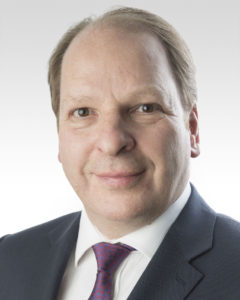Investment fundamentals should be followed by fund selectors, over chasing alpha, BMO multi-managers Gary Potter and Kelly Prior tell Rob Kingsbury.
“Fund selectors have got to be sensible; they have to stand back and look at what they are buying and at what price,” says Potter. “It’s right that people broaden their thought processes and look beyond what is doing well in the market today and find good quality people, investing sensibly with a longer term view.”
 Potter believes in current markets investors are confusing alpha with beta; they are seeing growth stocks – in particular the FAANGS which pay no or little in the way of dividend – rising in price and they are chasing those stocks, and funds heavily invested in growth, pushing up prices. “But that is not a situation that is going to last,” Potter says.
Potter believes in current markets investors are confusing alpha with beta; they are seeing growth stocks – in particular the FAANGS which pay no or little in the way of dividend – rising in price and they are chasing those stocks, and funds heavily invested in growth, pushing up prices. “But that is not a situation that is going to last,” Potter says.
Potter and Prior see a lot of the market as overpriced. As an example, they say, some S&P stocks are trading at over 20x next year’s earnings, and at that price there comes a time where they stop their upward trajectory. What investors should be looking for is funds invested in companies trading at around 10x earnings; “that’s where the future money will be made. You need to be where it feels uncomfortable at the moment, with managers that are prepared to be patient and look to the longer term.
“We have a bifurcated market at present, where the gap between growth and value is the largest it has ever been. This is creating a situation where the market is increasingly judging things on false parameters, which typically are linked to one and three-year performance,” says Potter.
“But the alpha in the market is not in the factors that have done very well to date, it’s on the periphery. Active management by its nature is affected to some extent by valuation. There have been some outstanding managers have taken a hit since March but they will come back.
“History shows that after every recession, and we are in a recession, it is value that leads the way,” Potter says. “There are many people selecting funds who have never seen value perform well, and it will come as a complete shock when, not if, it does.”
The managers believe economies and companies will be managed differently from now on and this will play into value companies. “There will be different dynamics around which companies are rewarded. Companies that invest in their futures and are a good business but are on 12x earnings at present because they happen to be cyclically tilted, look outstanding opportunities. But it won’t happen overnight.
“In a recession common sense dictates you are careful about the price you pay for what you buy. It’s also about what shareholders get back in terms of dividends or coupons. So we’re not chasing what went up last week; we’re common sense, patient investors.”
The team is adapting to the “new normal,” Potter adds. “The economic improvement which at the start 2020 we thought would happen from this year onwards has been pushed into the future. So we are buying more corporate debt to underpin our income stream into the immediate future, because bond coupons are contractual and equity dividends are not. This is paying us a decent yield and we are reducing equity exposure for now. “
 Prior says the multi-manager team recently bought its first high yield fund for a number of years. “In high yield at the moment you have to pick through the rubble but some of the fallen angels are absolutely perfect because you’re going to get paid well and the companies are going to be working harder than ever to get their balance sheets back up so they can be investment grade again. It’s balancing the risk we take, so we are not going strongly into high yield, we are picking a team that is investing carefully in companies with good paper. You’re going to get your money back and you’re going to get paid more in the meantime.
Prior says the multi-manager team recently bought its first high yield fund for a number of years. “In high yield at the moment you have to pick through the rubble but some of the fallen angels are absolutely perfect because you’re going to get paid well and the companies are going to be working harder than ever to get their balance sheets back up so they can be investment grade again. It’s balancing the risk we take, so we are not going strongly into high yield, we are picking a team that is investing carefully in companies with good paper. You’re going to get your money back and you’re going to get paid more in the meantime.
“We are not out of the woods with Covid yet, there is going to be more volatility and this is where the income from bonds can help smooth the risk profile.”
Cuts in dividends have affected the team’s funds, notably the BMO MM Navigator Distribution fund. “The fund is still one of highest paying in the market but income paying funds are by nature heavily valuation sensitive and when you’re looking for 4-5% yielding investments, that is where you will be hunting.
“We think that our next quarterly dividend will be impaired by around 20%, against market cuts of 40-50%. This is frustrating but we are not overly concerned about the potential for long-term dividends to come back.
“We will re-risk our portfolios from where we were but not just yet. Currently, we are happy taking the quality dividends from fixed income,” he says.
Looking forward, the team sees central bank action and government support via infrastructure projects as opportunities for recovery. “But the outlook is not that rosy and as managers we have to take extreme care when committing new money to the market.
“Our main job is to make money for clients long-term – we take a five to seven year outlook, looking to both beat inflation and cover the cost of advice. If we can do that consistently we get happy clients.
“Which is why we are more comfortable in funds where valuation is reasonable and sensible rather than the funds everyone else is chasing – because they are looking expensive.”
Pictured: (l-r) Paul Green, Anthony Willis, Rob Burdett, Wai-Ling Lam, Gary Potter, Adam Norris, Catherine Sauer, Kelly Prior, Scott Spencer (out of picture Rhianna Ford)



































